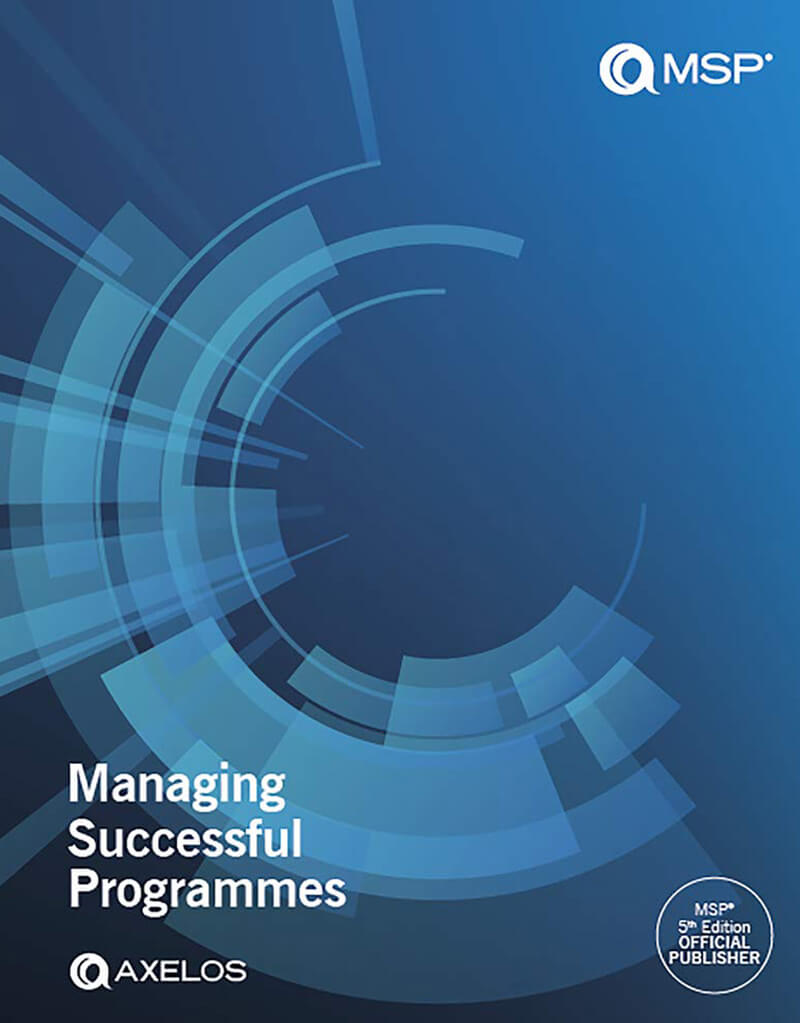Benefits of Managing Successful Programmes (MSP)

Managing Successful Programmes (MSP) is a framework to prepare you for this new world. The MSP Foundation 5th Edition is the first step in a two-step process to becoming an MSP expert. An MSP framework provides a structured approach to programme management, covering all aspects of the programme lifecycle.
If you are serious about managing your programmes successfully and achieving your strategic objectives, then MSP is a framework that you should consider using.
Managing Successful Programmes (MSP) For the Modern World
In an era of volatility like no other, programs like this benefits management more than ever. Failure rates are high, and change is becoming significantly more difficult to implement successfully.
Uncertainty has increased, and in a cruel twist of fate – firms also want changes to be implemented faster. It is the definition of ‘a double whammy’: a perfect storm for programme failure to occur.
MSP is a framework that emphasises flexibility and adaptability. In the modern world, where situations change at the flick of a switch, the MSP methodology provides an effective way to deal with this volatility.
It splits projects up into increments and lays out a system to deal with each step of the change process in an agile manner – so projects can ‘roll with the punches’ as is required in a VUCA world.
A certificate in MSP is beneficial as employers will value you significantly more if you can understand and adapt to the changes in today’s society. The MSP Foundation course gives you the tools to do precisely that.
Benefits of Managing Successful Programmes (MSP)
There are a ton of benefits to a managing successful programmes framework. Especially for a programme management team or program managers who take care of complex programs.
Strategic Alignment
Strategic alignment in programme management is about making sure your programme helps the organisation achieve its goals. It’s essential to align your programme with the organisation or programme office’s strategy because it means you’re working on the things that matter most.
Here are some of the benefits of strategic alignment:
- You’re more likely to achieve your programme’s goals or related projects.
- You’ll use resources more efficiently.
- Communication and collaboration between stakeholders will improve.
- The organisation will be more transparent and accountable.
- Quality and assurance management will be easier and more clearly executed.
Here are some tips for achieving strategic alignment:
- Clearly define your programme’s goals and objectives, and make sure they’re aligned with the organisation’s strategic goals.
- Communicate your programme’s goals and objectives to all stakeholders, and get their support.
- Develop a programme management plan that’s aligned with the organisation’s strategic plan.
- As a programme manager, regularly review your project to make sure it’s on track and still aligned with the organisation’s strategic goals.
- Make changes to your programme as needed to align it with the organisation’s strategic goals.
By following these tips, you can help ensure that your programmes are aligned with the organisation sponsoring group’s strategic goals and that they’re delivering the benefits that matter most.
Risk management
Programme management provides a structured approach to identifying, assessing, and managing risks and issues. This means that organisations can anticipate and mitigate potential problems before they occur.
Here are some of the benefits of risk management in programme management:
- Increased chances of success: By identifying and managing risks, organisations can increase their chances of successfully delivering their programmes.
- Reduced costs: By mitigating risks, organisations can avoid the costs associated with dealing with problems after they occur.
- Improved reputation: Organisations that are seen to be managing risks effectively are more likely to be trusted by stakeholders and to win new business.
There are a number of different risk management frameworks and tools that can be used in programme management. The most appropriate framework or tool will depend on the specific needs of the organization and the programme objectives.
Optimised resource allocation
Project management promotes the efficient use of resources, including people, technology, and budget. It helps in prioritising projects and allocating resources where they are needed most.
It can help to:
- Reduce costs
- Improve project efficiency
- Increase the chances of project success
For example, a business case where a project manager is responsible for delivering a new software product. The project manager has a limited budget and a team of experienced developers. So, he or she uses a WBS to identify the resources required for each task. With this, the manager then creates a resource histogram to identify potential resource bottlenecks.
Enhanced governance
Project management establishes clear roles, responsibilities, and decision-making processes. This ensures accountability and transparency in program management.
Benefits of enhanced governance in programme management:
- Improved decision-making: Clear roles and responsibilities help to ensure that decisions are made by the right people at the right time.
- Increased accountability: Clear roles and responsibilities help to ensure that people are accountable for their actions. Individuals understand their roles and the expectations associated with them, promoting a sense of ownership and responsibility for their actions and outcomes.
- Enhanced transparency: Transparent decision-making processes help to ensure that decisions are made in a clear and fair manner. It ensures that the decisions are conducted openly and fairly, giving stakeholders insights into how choices are made. This transparency fosters trust and confidence in the program management system.
- Reduced risk: Clear roles, responsibilities, and decision-making processes help to reduce the risk of errors and omissions. By reducing ambiguities and potential for misunderstandings, risks stemming from errors, omissions, or miscommunication are minimised. This risk reduction is pivotal in maintaining smooth program progression.
- Improved stakeholder confidence: Enhanced governance helps to build stakeholder confidence in the programme management process.
Stakeholder engagement
A proper project management provides tools and techniques for effective communication and stakeholder management. This helps in aligning the expectations and needs of different stakeholder groups.
It is an important part of project management because it can help to:
- Ensure that the project meets the needs of all stakeholders
- Reduce conflict and delays
- Increase buy-in and support for the project
Who Should Consider MSP?
MSP is a framework that can be used by organisations of all sizes and in all industries. However, it is particularly beneficial for organisations that:
- Are looking to improve their program management capabilities
- Have complex programs that involve multiple stakeholders and projects
- Are operating in a rapidly changing environment
- Are subject to high levels of compliance and regulatory requirements
MSP is also a valuable framework for professionals in project and program management roles. It can help them to develop the skills and knowledge they need to manage complex programs successfully.
Some of the industries where MSP can be particularly beneficial include:
- IT
- Healthcare
- Government
- Manufacturing
- Construction
- Financial services
How to Implement MSP
The implementation of MSP in an organisation typically involves the following steps:
- Assessment: The organisation’s current program management capabilities are assessed to identify areas for improvement.
- Planning: A plan is developed for implementing MSP in the organisation. The plan should include a timeline, budget, and resources.
- Implementation: The MSP framework is implemented in the organisation. This may involve training staff, developing new processes and procedures, and implementing new tools and technologies.
- Monitoring and evaluation: The implementation of MSP is monitored and evaluated to ensure that it is effective and that the organisation is achieving its desired outcomes.
When implementing MSP, it is important to adapt it to the specific context of the organisation. This includes considering the organisation’s size, industry, culture, and maturity level.
There are a number of MSP training and certification options available. These options can be provided by MSP training providers or by the MSP Foundation, the organisation that develops and maintains the framework.
Discover the Power of the Managing Successful Programmes Framework
In today’s rapidly changing world, professionals need a robust framework to navigate the complexities of programme management. The Managing Successful Programmes Foundation Course offers a comprehensive approach, ensuring that you’re equipped with the tools and knowledge to manage programmes effectively. Dive deep into the MSP methodology, which emphasises flexibility, adaptability, and strategic alignment. Whether you’re a seasoned programme manager or just starting out, this course will enhance your skills, making you an invaluable asset in any organisation.
Become an all-round manager
MSP is not only for project managers and programme managers. This course is relevant to business change managers, project delivery teams, as well as any members of the team who are part of the programme.
If you are looking to expand your knowledge, increasing your understanding of the MSP framework by taking the MSP Foundation exam is a great way to prove your importance to your team.
Become an all-rounder, invaluable, and a wealth of opportunities will start presenting themselves to you.
The bottom line
MSP is an excellent option for those who want to prove they are ready to take the next step in their careers. It is for those who have the ambition to go for that promotion, to lead the largest programmes, and even for those who simply want to expand their knowledge of different programme management frameworks.
If you are looking for a course that has been optimised for the modern world – for something relevant and brand new, you simply cannot go wrong with the MSP Foundation 5th edition.
Book an MSP Course with Althris Training Today at: https://althris.com/
If you need any assistance or have further MSP questions, contact our experienced trainers or consultants at: info@althris.com
We will be happy to help!






